NURS1006 Introduction to Professional Practice: Aboriginal Success
VerifiedAdded on 2023/06/16
|7
|1834
|281
Essay
AI Summary
This essay critically deconstructs the question, "Why aren't Aborigines interested in being successful?" by exploring the historical context of Aboriginal Australians, including the impact of the Stolen Generations and the assimilation policy. It examines statistical data on life expectancy and socioeconomic factors, highlighting the role of racial discrimination in limiting employment opportunities and overall well-being. The essay argues that systemic racism and social exclusion, rather than a lack of motivation, are significant barriers to Aboriginal success. It further emphasizes the need for cultural awareness training and anti-discrimination strategies to promote inclusivity and improve health outcomes for Indigenous Australians. The analysis concludes that addressing racial discrimination is crucial for enhancing the health and well-being of Aboriginal communities and building a more equitable society. Desklib provides this and other solved assignments to aid students in their studies.
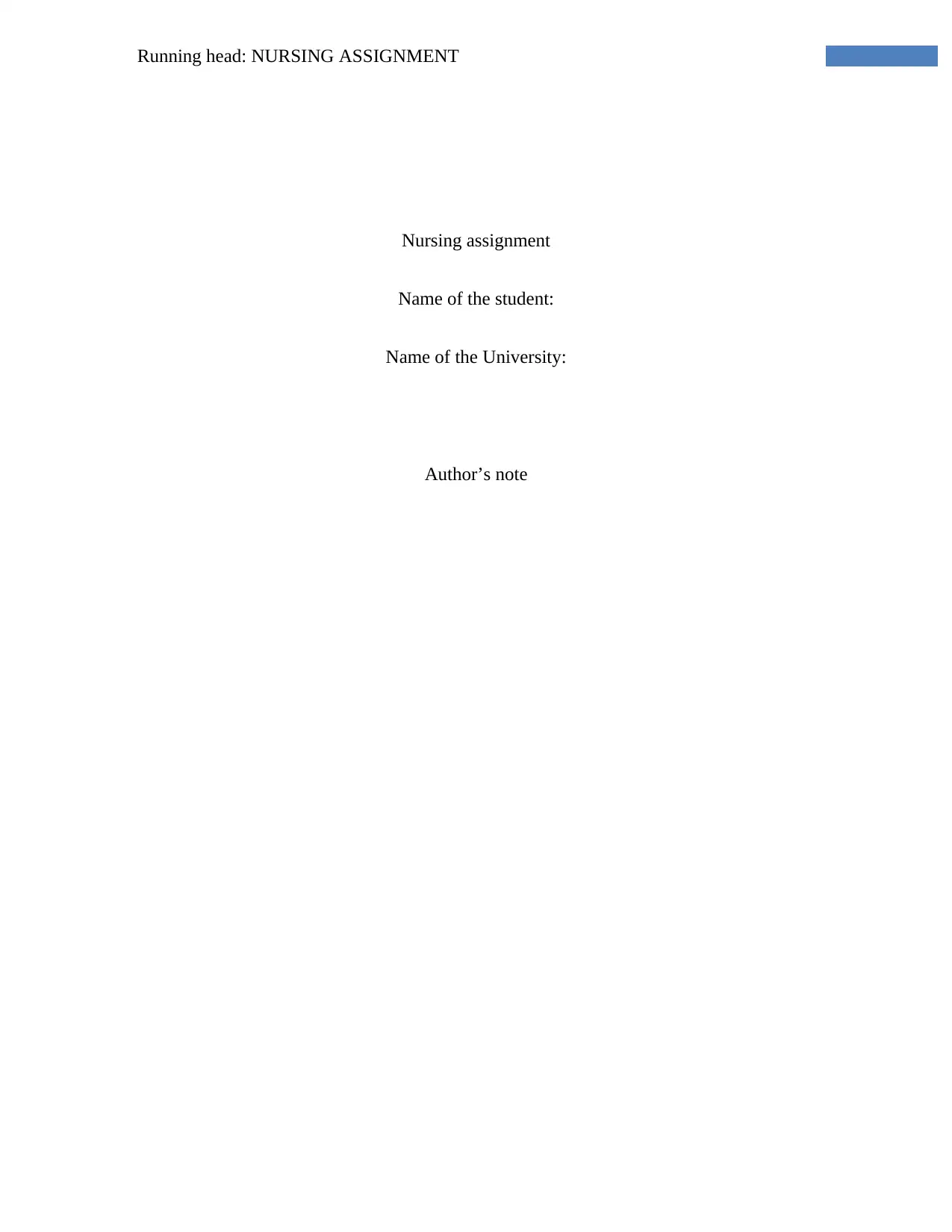
Running head: NURSING ASSIGNMENT
Nursing assignment
Name of the student:
Name of the University:
Author’s note
Nursing assignment
Name of the student:
Name of the University:
Author’s note
Paraphrase This Document
Need a fresh take? Get an instant paraphrase of this document with our AI Paraphraser
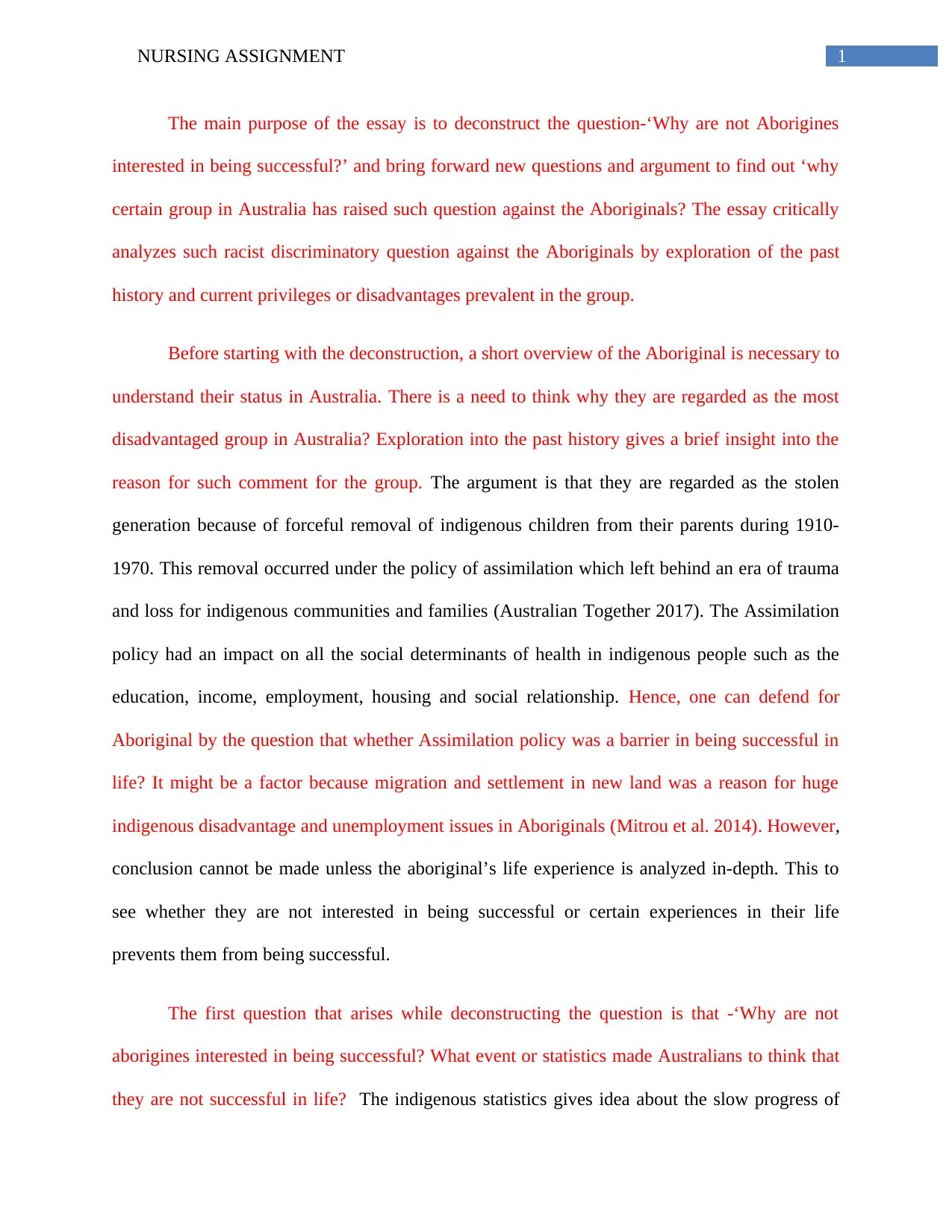
1NURSING ASSIGNMENT
The main purpose of the essay is to deconstruct the question-‘Why are not Aborigines
interested in being successful?’ and bring forward new questions and argument to find out ‘why
certain group in Australia has raised such question against the Aboriginals? The essay critically
analyzes such racist discriminatory question against the Aboriginals by exploration of the past
history and current privileges or disadvantages prevalent in the group.
Before starting with the deconstruction, a short overview of the Aboriginal is necessary to
understand their status in Australia. There is a need to think why they are regarded as the most
disadvantaged group in Australia? Exploration into the past history gives a brief insight into the
reason for such comment for the group. The argument is that they are regarded as the stolen
generation because of forceful removal of indigenous children from their parents during 1910-
1970. This removal occurred under the policy of assimilation which left behind an era of trauma
and loss for indigenous communities and families (Australian Together 2017). The Assimilation
policy had an impact on all the social determinants of health in indigenous people such as the
education, income, employment, housing and social relationship. Hence, one can defend for
Aboriginal by the question that whether Assimilation policy was a barrier in being successful in
life? It might be a factor because migration and settlement in new land was a reason for huge
indigenous disadvantage and unemployment issues in Aboriginals (Mitrou et al. 2014). However,
conclusion cannot be made unless the aboriginal’s life experience is analyzed in-depth. This to
see whether they are not interested in being successful or certain experiences in their life
prevents them from being successful.
The first question that arises while deconstructing the question is that -‘Why are not
aborigines interested in being successful? What event or statistics made Australians to think that
they are not successful in life? The indigenous statistics gives idea about the slow progress of
The main purpose of the essay is to deconstruct the question-‘Why are not Aborigines
interested in being successful?’ and bring forward new questions and argument to find out ‘why
certain group in Australia has raised such question against the Aboriginals? The essay critically
analyzes such racist discriminatory question against the Aboriginals by exploration of the past
history and current privileges or disadvantages prevalent in the group.
Before starting with the deconstruction, a short overview of the Aboriginal is necessary to
understand their status in Australia. There is a need to think why they are regarded as the most
disadvantaged group in Australia? Exploration into the past history gives a brief insight into the
reason for such comment for the group. The argument is that they are regarded as the stolen
generation because of forceful removal of indigenous children from their parents during 1910-
1970. This removal occurred under the policy of assimilation which left behind an era of trauma
and loss for indigenous communities and families (Australian Together 2017). The Assimilation
policy had an impact on all the social determinants of health in indigenous people such as the
education, income, employment, housing and social relationship. Hence, one can defend for
Aboriginal by the question that whether Assimilation policy was a barrier in being successful in
life? It might be a factor because migration and settlement in new land was a reason for huge
indigenous disadvantage and unemployment issues in Aboriginals (Mitrou et al. 2014). However,
conclusion cannot be made unless the aboriginal’s life experience is analyzed in-depth. This to
see whether they are not interested in being successful or certain experiences in their life
prevents them from being successful.
The first question that arises while deconstructing the question is that -‘Why are not
aborigines interested in being successful? What event or statistics made Australians to think that
they are not successful in life? The indigenous statistics gives idea about the slow progress of
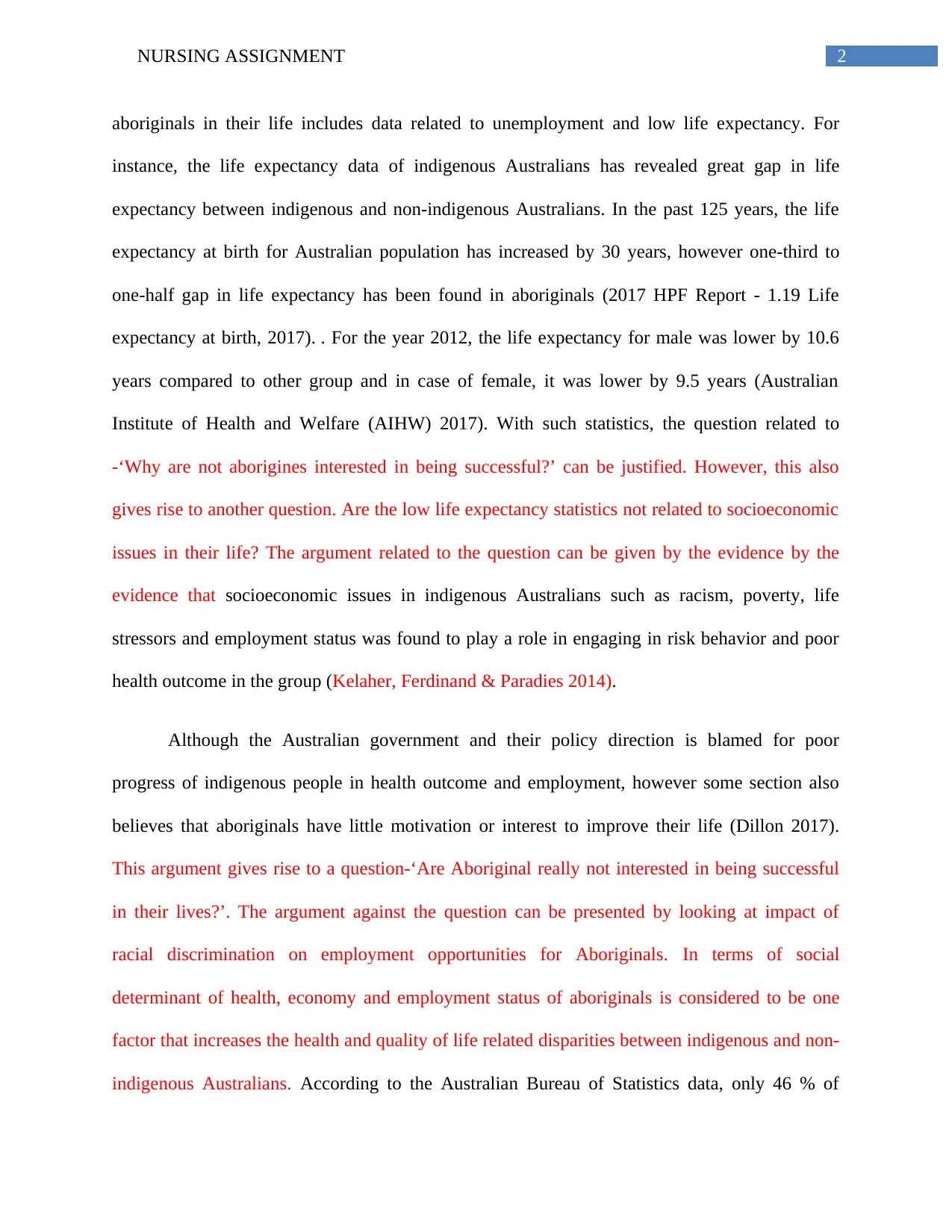
2NURSING ASSIGNMENT
aboriginals in their life includes data related to unemployment and low life expectancy. For
instance, the life expectancy data of indigenous Australians has revealed great gap in life
expectancy between indigenous and non-indigenous Australians. In the past 125 years, the life
expectancy at birth for Australian population has increased by 30 years, however one-third to
one-half gap in life expectancy has been found in aboriginals (2017 HPF Report - 1.19 Life
expectancy at birth, 2017). . For the year 2012, the life expectancy for male was lower by 10.6
years compared to other group and in case of female, it was lower by 9.5 years (Australian
Institute of Health and Welfare (AIHW) 2017). With such statistics, the question related to
-‘Why are not aborigines interested in being successful?’ can be justified. However, this also
gives rise to another question. Are the low life expectancy statistics not related to socioeconomic
issues in their life? The argument related to the question can be given by the evidence by the
evidence that socioeconomic issues in indigenous Australians such as racism, poverty, life
stressors and employment status was found to play a role in engaging in risk behavior and poor
health outcome in the group (Kelaher, Ferdinand & Paradies 2014).
Although the Australian government and their policy direction is blamed for poor
progress of indigenous people in health outcome and employment, however some section also
believes that aboriginals have little motivation or interest to improve their life (Dillon 2017).
This argument gives rise to a question-‘Are Aboriginal really not interested in being successful
in their lives?’. The argument against the question can be presented by looking at impact of
racial discrimination on employment opportunities for Aboriginals. In terms of social
determinant of health, economy and employment status of aboriginals is considered to be one
factor that increases the health and quality of life related disparities between indigenous and non-
indigenous Australians. According to the Australian Bureau of Statistics data, only 46 % of
aboriginals in their life includes data related to unemployment and low life expectancy. For
instance, the life expectancy data of indigenous Australians has revealed great gap in life
expectancy between indigenous and non-indigenous Australians. In the past 125 years, the life
expectancy at birth for Australian population has increased by 30 years, however one-third to
one-half gap in life expectancy has been found in aboriginals (2017 HPF Report - 1.19 Life
expectancy at birth, 2017). . For the year 2012, the life expectancy for male was lower by 10.6
years compared to other group and in case of female, it was lower by 9.5 years (Australian
Institute of Health and Welfare (AIHW) 2017). With such statistics, the question related to
-‘Why are not aborigines interested in being successful?’ can be justified. However, this also
gives rise to another question. Are the low life expectancy statistics not related to socioeconomic
issues in their life? The argument related to the question can be given by the evidence by the
evidence that socioeconomic issues in indigenous Australians such as racism, poverty, life
stressors and employment status was found to play a role in engaging in risk behavior and poor
health outcome in the group (Kelaher, Ferdinand & Paradies 2014).
Although the Australian government and their policy direction is blamed for poor
progress of indigenous people in health outcome and employment, however some section also
believes that aboriginals have little motivation or interest to improve their life (Dillon 2017).
This argument gives rise to a question-‘Are Aboriginal really not interested in being successful
in their lives?’. The argument against the question can be presented by looking at impact of
racial discrimination on employment opportunities for Aboriginals. In terms of social
determinant of health, economy and employment status of aboriginals is considered to be one
factor that increases the health and quality of life related disparities between indigenous and non-
indigenous Australians. According to the Australian Bureau of Statistics data, only 46 % of
⊘ This is a preview!⊘
Do you want full access?
Subscribe today to unlock all pages.

Trusted by 1+ million students worldwide
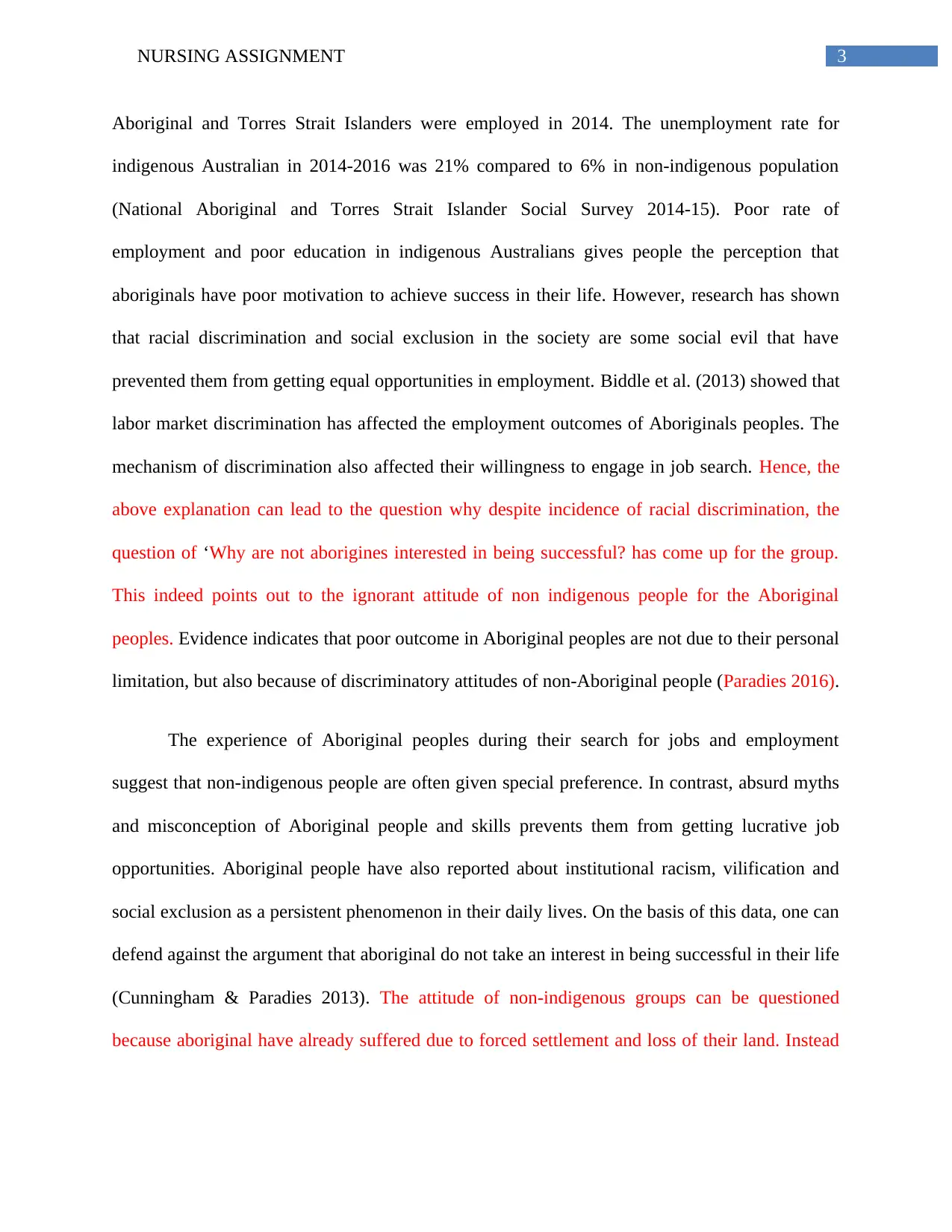
3NURSING ASSIGNMENT
Aboriginal and Torres Strait Islanders were employed in 2014. The unemployment rate for
indigenous Australian in 2014-2016 was 21% compared to 6% in non-indigenous population
(National Aboriginal and Torres Strait Islander Social Survey 2014-15). Poor rate of
employment and poor education in indigenous Australians gives people the perception that
aboriginals have poor motivation to achieve success in their life. However, research has shown
that racial discrimination and social exclusion in the society are some social evil that have
prevented them from getting equal opportunities in employment. Biddle et al. (2013) showed that
labor market discrimination has affected the employment outcomes of Aboriginals peoples. The
mechanism of discrimination also affected their willingness to engage in job search. Hence, the
above explanation can lead to the question why despite incidence of racial discrimination, the
question of ‘Why are not aborigines interested in being successful? has come up for the group.
This indeed points out to the ignorant attitude of non indigenous people for the Aboriginal
peoples. Evidence indicates that poor outcome in Aboriginal peoples are not due to their personal
limitation, but also because of discriminatory attitudes of non-Aboriginal people (Paradies 2016).
The experience of Aboriginal peoples during their search for jobs and employment
suggest that non-indigenous people are often given special preference. In contrast, absurd myths
and misconception of Aboriginal people and skills prevents them from getting lucrative job
opportunities. Aboriginal people have also reported about institutional racism, vilification and
social exclusion as a persistent phenomenon in their daily lives. On the basis of this data, one can
defend against the argument that aboriginal do not take an interest in being successful in their life
(Cunningham & Paradies 2013). The attitude of non-indigenous groups can be questioned
because aboriginal have already suffered due to forced settlement and loss of their land. Instead
Aboriginal and Torres Strait Islanders were employed in 2014. The unemployment rate for
indigenous Australian in 2014-2016 was 21% compared to 6% in non-indigenous population
(National Aboriginal and Torres Strait Islander Social Survey 2014-15). Poor rate of
employment and poor education in indigenous Australians gives people the perception that
aboriginals have poor motivation to achieve success in their life. However, research has shown
that racial discrimination and social exclusion in the society are some social evil that have
prevented them from getting equal opportunities in employment. Biddle et al. (2013) showed that
labor market discrimination has affected the employment outcomes of Aboriginals peoples. The
mechanism of discrimination also affected their willingness to engage in job search. Hence, the
above explanation can lead to the question why despite incidence of racial discrimination, the
question of ‘Why are not aborigines interested in being successful? has come up for the group.
This indeed points out to the ignorant attitude of non indigenous people for the Aboriginal
peoples. Evidence indicates that poor outcome in Aboriginal peoples are not due to their personal
limitation, but also because of discriminatory attitudes of non-Aboriginal people (Paradies 2016).
The experience of Aboriginal peoples during their search for jobs and employment
suggest that non-indigenous people are often given special preference. In contrast, absurd myths
and misconception of Aboriginal people and skills prevents them from getting lucrative job
opportunities. Aboriginal people have also reported about institutional racism, vilification and
social exclusion as a persistent phenomenon in their daily lives. On the basis of this data, one can
defend against the argument that aboriginal do not take an interest in being successful in their life
(Cunningham & Paradies 2013). The attitude of non-indigenous groups can be questioned
because aboriginal have already suffered due to forced settlement and loss of their land. Instead
Paraphrase This Document
Need a fresh take? Get an instant paraphrase of this document with our AI Paraphraser
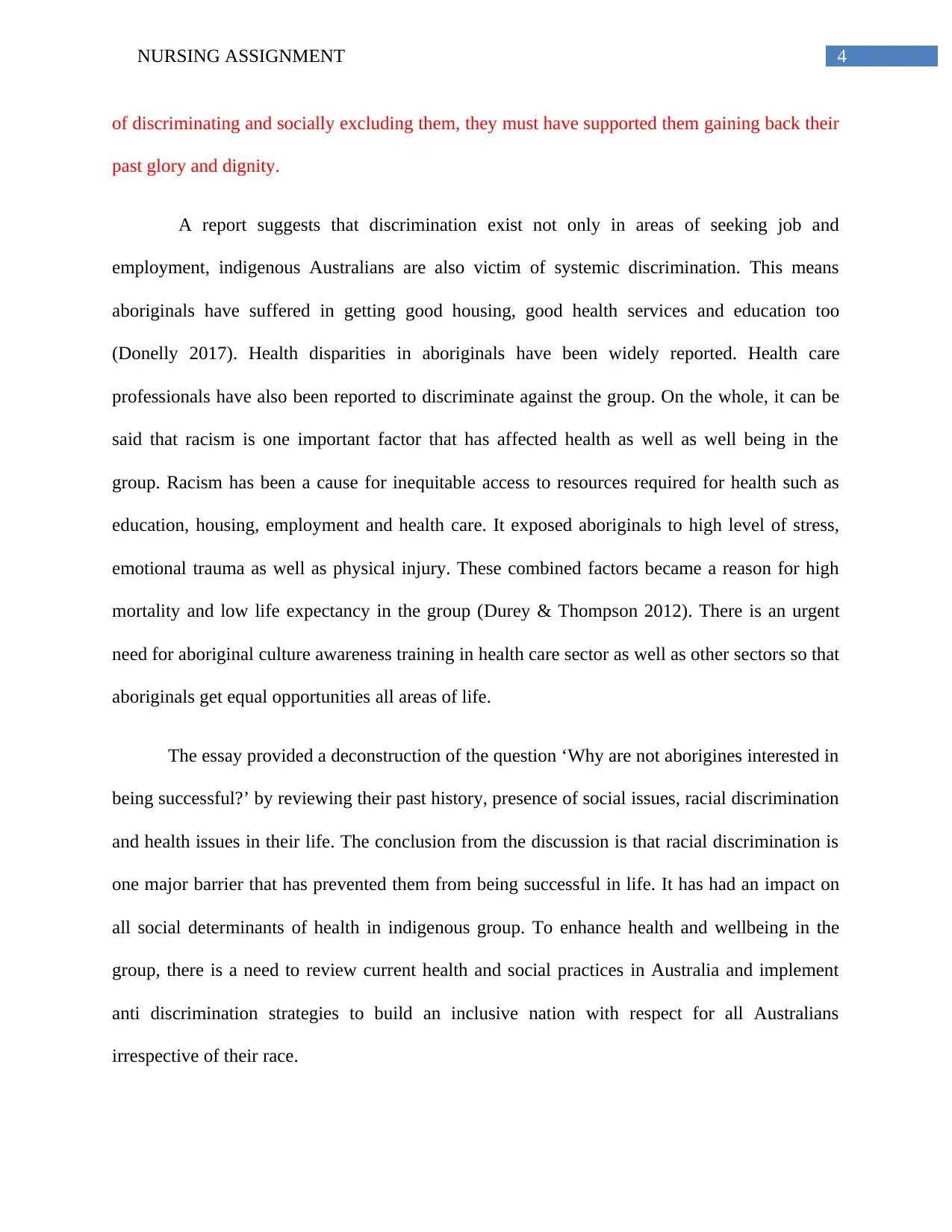
4NURSING ASSIGNMENT
of discriminating and socially excluding them, they must have supported them gaining back their
past glory and dignity.
A report suggests that discrimination exist not only in areas of seeking job and
employment, indigenous Australians are also victim of systemic discrimination. This means
aboriginals have suffered in getting good housing, good health services and education too
(Donelly 2017). Health disparities in aboriginals have been widely reported. Health care
professionals have also been reported to discriminate against the group. On the whole, it can be
said that racism is one important factor that has affected health as well as well being in the
group. Racism has been a cause for inequitable access to resources required for health such as
education, housing, employment and health care. It exposed aboriginals to high level of stress,
emotional trauma as well as physical injury. These combined factors became a reason for high
mortality and low life expectancy in the group (Durey & Thompson 2012). There is an urgent
need for aboriginal culture awareness training in health care sector as well as other sectors so that
aboriginals get equal opportunities all areas of life.
The essay provided a deconstruction of the question ‘Why are not aborigines interested in
being successful?’ by reviewing their past history, presence of social issues, racial discrimination
and health issues in their life. The conclusion from the discussion is that racial discrimination is
one major barrier that has prevented them from being successful in life. It has had an impact on
all social determinants of health in indigenous group. To enhance health and wellbeing in the
group, there is a need to review current health and social practices in Australia and implement
anti discrimination strategies to build an inclusive nation with respect for all Australians
irrespective of their race.
of discriminating and socially excluding them, they must have supported them gaining back their
past glory and dignity.
A report suggests that discrimination exist not only in areas of seeking job and
employment, indigenous Australians are also victim of systemic discrimination. This means
aboriginals have suffered in getting good housing, good health services and education too
(Donelly 2017). Health disparities in aboriginals have been widely reported. Health care
professionals have also been reported to discriminate against the group. On the whole, it can be
said that racism is one important factor that has affected health as well as well being in the
group. Racism has been a cause for inequitable access to resources required for health such as
education, housing, employment and health care. It exposed aboriginals to high level of stress,
emotional trauma as well as physical injury. These combined factors became a reason for high
mortality and low life expectancy in the group (Durey & Thompson 2012). There is an urgent
need for aboriginal culture awareness training in health care sector as well as other sectors so that
aboriginals get equal opportunities all areas of life.
The essay provided a deconstruction of the question ‘Why are not aborigines interested in
being successful?’ by reviewing their past history, presence of social issues, racial discrimination
and health issues in their life. The conclusion from the discussion is that racial discrimination is
one major barrier that has prevented them from being successful in life. It has had an impact on
all social determinants of health in indigenous group. To enhance health and wellbeing in the
group, there is a need to review current health and social practices in Australia and implement
anti discrimination strategies to build an inclusive nation with respect for all Australians
irrespective of their race.
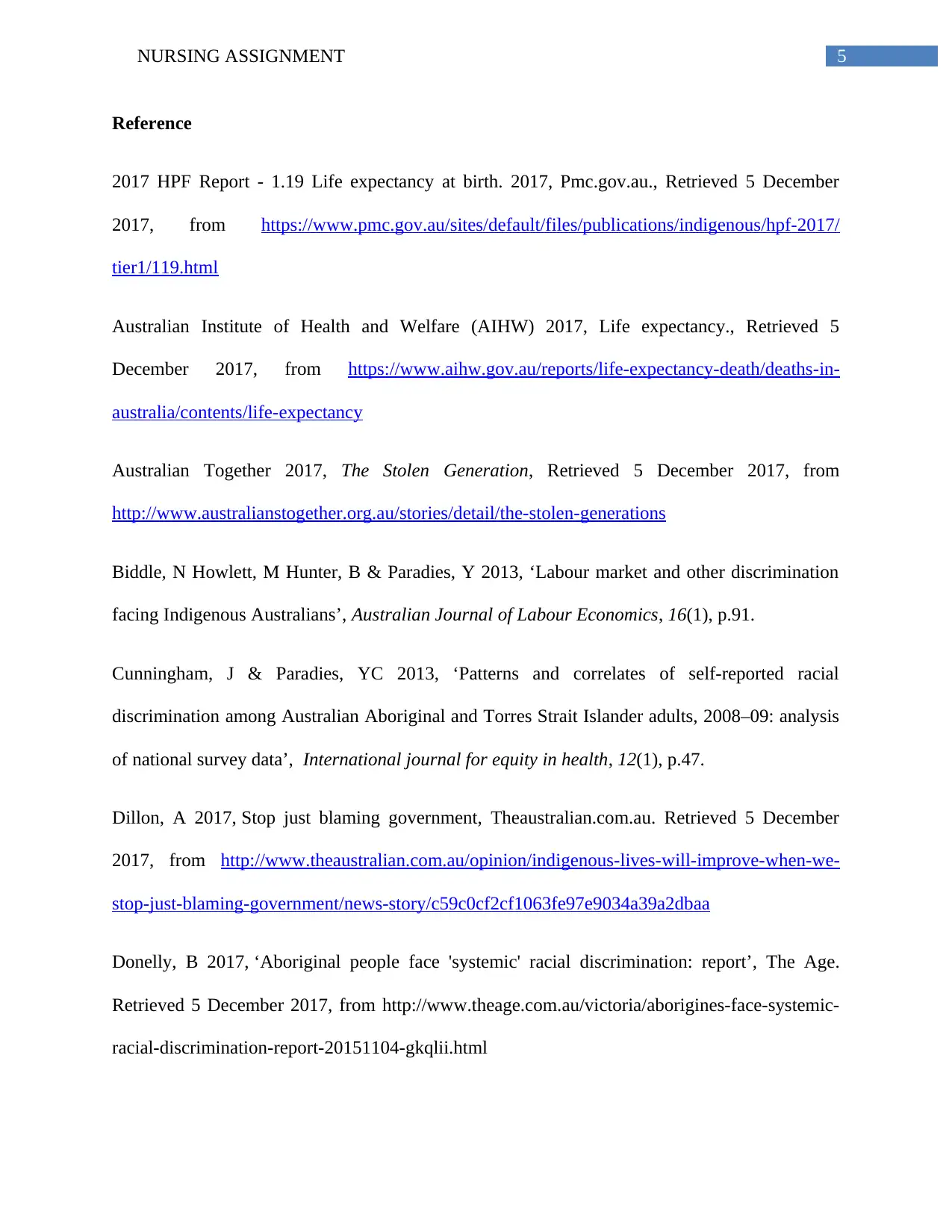
5NURSING ASSIGNMENT
Reference
2017 HPF Report - 1.19 Life expectancy at birth. 2017, Pmc.gov.au., Retrieved 5 December
2017, from https://www.pmc.gov.au/sites/default/files/publications/indigenous/hpf-2017/
tier1/119.html
Australian Institute of Health and Welfare (AIHW) 2017, Life expectancy., Retrieved 5
December 2017, from https://www.aihw.gov.au/reports/life-expectancy-death/deaths-in-
australia/contents/life-expectancy
Australian Together 2017, The Stolen Generation, Retrieved 5 December 2017, from
http://www.australianstogether.org.au/stories/detail/the-stolen-generations
Biddle, N Howlett, M Hunter, B & Paradies, Y 2013, ‘Labour market and other discrimination
facing Indigenous Australians’, Australian Journal of Labour Economics, 16(1), p.91.
Cunningham, J & Paradies, YC 2013, ‘Patterns and correlates of self-reported racial
discrimination among Australian Aboriginal and Torres Strait Islander adults, 2008–09: analysis
of national survey data’, International journal for equity in health, 12(1), p.47.
Dillon, A 2017, Stop just blaming government, Theaustralian.com.au. Retrieved 5 December
2017, from http://www.theaustralian.com.au/opinion/indigenous-lives-will-improve-when-we-
stop-just-blaming-government/news-story/c59c0cf2cf1063fe97e9034a39a2dbaa
Donelly, B 2017, ‘Aboriginal people face 'systemic' racial discrimination: report’, The Age.
Retrieved 5 December 2017, from http://www.theage.com.au/victoria/aborigines-face-systemic-
racial-discrimination-report-20151104-gkqlii.html
Reference
2017 HPF Report - 1.19 Life expectancy at birth. 2017, Pmc.gov.au., Retrieved 5 December
2017, from https://www.pmc.gov.au/sites/default/files/publications/indigenous/hpf-2017/
tier1/119.html
Australian Institute of Health and Welfare (AIHW) 2017, Life expectancy., Retrieved 5
December 2017, from https://www.aihw.gov.au/reports/life-expectancy-death/deaths-in-
australia/contents/life-expectancy
Australian Together 2017, The Stolen Generation, Retrieved 5 December 2017, from
http://www.australianstogether.org.au/stories/detail/the-stolen-generations
Biddle, N Howlett, M Hunter, B & Paradies, Y 2013, ‘Labour market and other discrimination
facing Indigenous Australians’, Australian Journal of Labour Economics, 16(1), p.91.
Cunningham, J & Paradies, YC 2013, ‘Patterns and correlates of self-reported racial
discrimination among Australian Aboriginal and Torres Strait Islander adults, 2008–09: analysis
of national survey data’, International journal for equity in health, 12(1), p.47.
Dillon, A 2017, Stop just blaming government, Theaustralian.com.au. Retrieved 5 December
2017, from http://www.theaustralian.com.au/opinion/indigenous-lives-will-improve-when-we-
stop-just-blaming-government/news-story/c59c0cf2cf1063fe97e9034a39a2dbaa
Donelly, B 2017, ‘Aboriginal people face 'systemic' racial discrimination: report’, The Age.
Retrieved 5 December 2017, from http://www.theage.com.au/victoria/aborigines-face-systemic-
racial-discrimination-report-20151104-gkqlii.html
⊘ This is a preview!⊘
Do you want full access?
Subscribe today to unlock all pages.

Trusted by 1+ million students worldwide
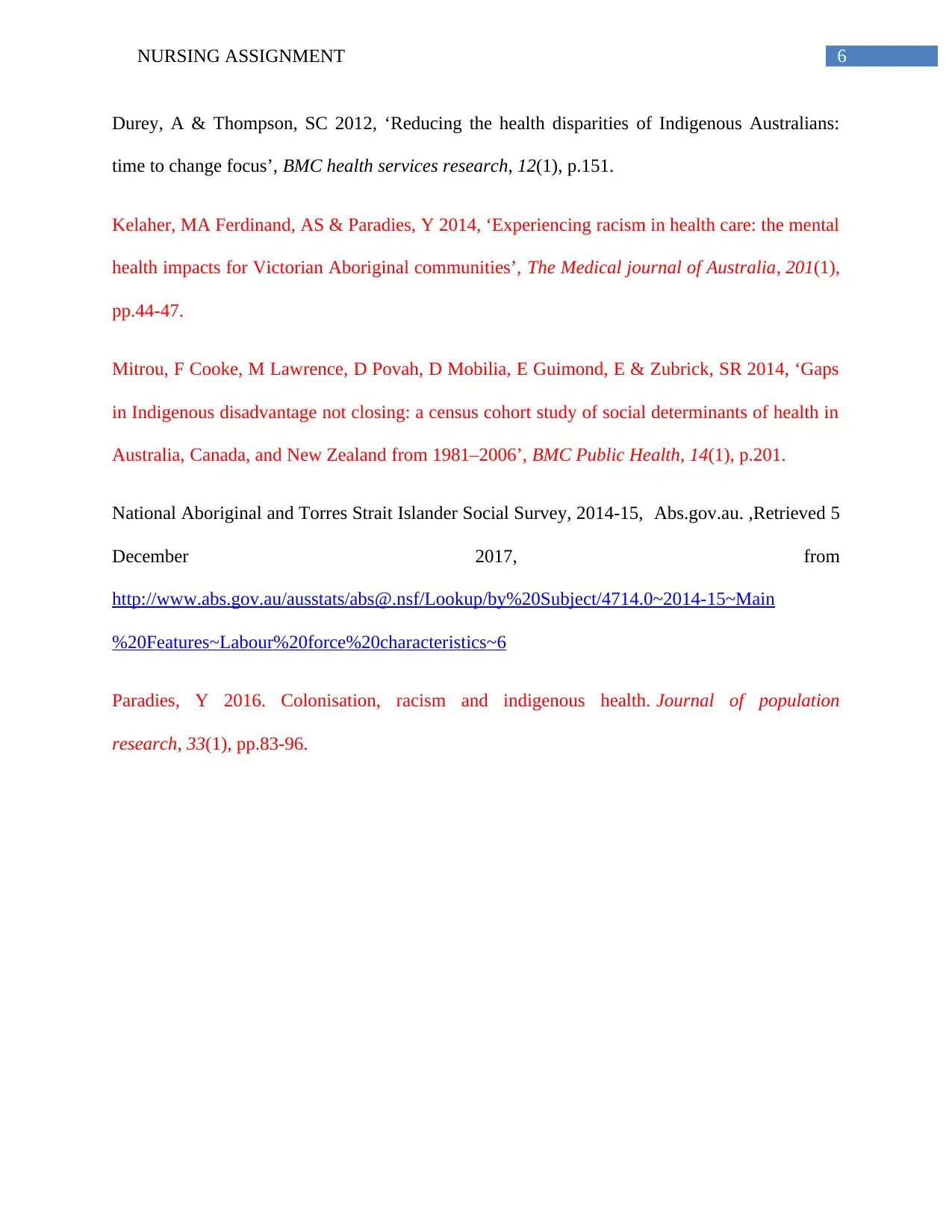
6NURSING ASSIGNMENT
Durey, A & Thompson, SC 2012, ‘Reducing the health disparities of Indigenous Australians:
time to change focus’, BMC health services research, 12(1), p.151.
Kelaher, MA Ferdinand, AS & Paradies, Y 2014, ‘Experiencing racism in health care: the mental
health impacts for Victorian Aboriginal communities’, The Medical journal of Australia, 201(1),
pp.44-47.
Mitrou, F Cooke, M Lawrence, D Povah, D Mobilia, E Guimond, E & Zubrick, SR 2014, ‘Gaps
in Indigenous disadvantage not closing: a census cohort study of social determinants of health in
Australia, Canada, and New Zealand from 1981–2006’, BMC Public Health, 14(1), p.201.
National Aboriginal and Torres Strait Islander Social Survey, 2014-15, Abs.gov.au. ,Retrieved 5
December 2017, from
http://www.abs.gov.au/ausstats/abs@.nsf/Lookup/by%20Subject/4714.0~2014-15~Main
%20Features~Labour%20force%20characteristics~6
Paradies, Y 2016. Colonisation, racism and indigenous health. Journal of population
research, 33(1), pp.83-96.
Durey, A & Thompson, SC 2012, ‘Reducing the health disparities of Indigenous Australians:
time to change focus’, BMC health services research, 12(1), p.151.
Kelaher, MA Ferdinand, AS & Paradies, Y 2014, ‘Experiencing racism in health care: the mental
health impacts for Victorian Aboriginal communities’, The Medical journal of Australia, 201(1),
pp.44-47.
Mitrou, F Cooke, M Lawrence, D Povah, D Mobilia, E Guimond, E & Zubrick, SR 2014, ‘Gaps
in Indigenous disadvantage not closing: a census cohort study of social determinants of health in
Australia, Canada, and New Zealand from 1981–2006’, BMC Public Health, 14(1), p.201.
National Aboriginal and Torres Strait Islander Social Survey, 2014-15, Abs.gov.au. ,Retrieved 5
December 2017, from
http://www.abs.gov.au/ausstats/abs@.nsf/Lookup/by%20Subject/4714.0~2014-15~Main
%20Features~Labour%20force%20characteristics~6
Paradies, Y 2016. Colonisation, racism and indigenous health. Journal of population
research, 33(1), pp.83-96.
1 out of 7
Related Documents
Your All-in-One AI-Powered Toolkit for Academic Success.
+13062052269
info@desklib.com
Available 24*7 on WhatsApp / Email
![[object Object]](/_next/static/media/star-bottom.7253800d.svg)
Unlock your academic potential
Copyright © 2020–2025 A2Z Services. All Rights Reserved. Developed and managed by ZUCOL.





